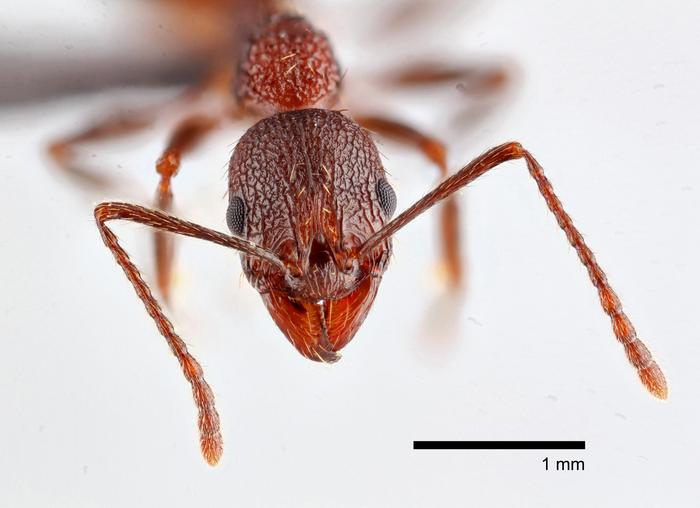There’s a species of ant that is so rare, only a handful of records exist from across the entire eastern United States. North Carolina State University researcher Michelle Kirchner not only found these ants in the Triangle region of North Carolina, she is the first to document an entire colony for scientists, taxonomists and ant-thusiasts everywhere.

Credit: Matt Bertone
There’s a species of ant that is so rare, only a handful of records exist from across the entire eastern United States. North Carolina State University researcher Michelle Kirchner not only found these ants in the Triangle region of North Carolina, she is the first to document an entire colony for scientists, taxonomists and ant-thusiasts everywhere.
Aphaenogaster mariae Forel are a rare type of spine-wasted ant. Unlike their cousins that nest mostly in the detritus of forest floors, these ants live most of their lives high in tree canopies. This arboreal lifecycle is a fairly common practice for ants in tropical areas, but little was known about the presence or prevalence of arboreal ants in the Triangle, until now.
“I was not expecting to find these ants at all, so I was shocked when I found an entire colony,” says Michelle Kirchner, lead author of a paper on the work and a Ph.D. student in applied ecology and entomology at NC State. “With the whole colony, we’re able to document every life stage of this rare ant species, which is a first for science.”
Until now, there were no photographs or documented collections of the males of this species. Likewise, it is unknown how many populations exist, where they are, or what habitats they prefer. However, these new, detailed descriptions of all members of the colony provide some clues.
“The queens of these species are pretty small compared to other ant queens,” says Kirchner. “This small body type is similar to parasitic ant queens since being small makes them more easily mistaken as a fellow worker ant by a colony she is about to infiltrate.”
Around 250 species of ant have been identified in North Carolina, and Kirchner’s rediscovery of this species helps us better understand the unique makeup of North Carolina’s biodiversity.
“We don’t know how important this species is to the ecology of forests in the Triangle,” says Kirchner. “This different surveying effort has changed what we’re finding and our perspective on what’s possible out there. There are still discoveries to be made, even in the Neuse River game lands.”
“This is a great case of a species that’s so rarely encountered that it’s impossible to draw any conclusions about how rare it actually is or isn’t,” says Elsa Youngsteadt, a professor of applied ecology at NC State and co-author of the study. “Michelle’s observations suggest that these species are fairly localized, but more work needs to be done.”
The paper, “Colony structure and redescription of males in the rarely collected arboreal ant, Aphaenogaster mariae Forel (Hymenoptera: Formicidae)” is published in the Proceedings of the Entomological Society of Washington. The paper was co-authored by Matthew Bertone of NC State University and Bonnie Blaimer of the Leibniz Institute for Evolution and Biodiversity Science.
Journal
Proceedings of the Entomological Society of Washington
DOI
10.4289/0013-8797.125.1.77
Method of Research
Case study
Subject of Research
Animals
Article Title
Colony structure and redescription of males in the rarely collected arboreal ant, Aphaenogaster mariae Forel (Hymenoptera: Formicidae)
Article Publication Date
16-Nov-2023
COI Statement
none




